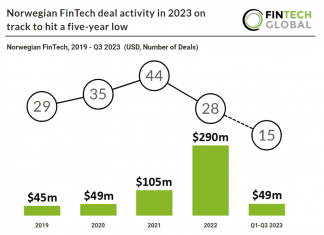Founded in 2015, Australian RegTech Arctic Intelligence is a global company that has developed enterprise risk assessment software enabling regulated businesses to better assess, document and manage their financial crime risks.
According to Anthony Quinn, CEO and Founder of Arctic Intelligence, the company currently has hundreds of different clients in over 20 different industry sectors – mostly in the areas of financial services, gaming and wagering and designated non-financial services – across a vast range of different geographical markets.
Quinn remarked that the company helps these regulated businesses strengthen their financial crime risk management frameworks by offering technology solutions that enable these businesses to identify and evaluate their financial crime risks and vulnerabilities. This, in turn, allows them to assess the design and operational effectiveness of their control frameworks and strengthen them through continuous improvements.
Arctic Intelligence currently offers three technology platforms or cloud-based solutions. Two of which are in the business-wide financial crime risk assessment space and the third in the audit and assurance space.
Quinn stated, “In the business-wide risk assessment space, our AML Accelerate product is primarily designed for SMEs that want to conduct money laundering and terrorism financing risk assessments as well as develop compliance AML policies. This platform is designed as a guide-in solution.
“The risk assessment within this platform has been tailored to 30 different industry sectors, which are all available on our website, and to 30 countries around the world,” said Quinn.
The company’s second platform is also a risk assessment capability but is designed for larger enterprises that want to be able to configure the risk management framework to their requirements. “Within Risk Assessment Platform, they can tailor the methodology to suit their risk management framework. If they’re looking at digitising from a spreadsheet-based approach – which is still quite prevalent – they can essentially deconstruct and reconstruct their spreadsheet-based models in our platform,” Quinn stated.
Arctic’s third platform is called the Health Check. It is designed to support independent reviews of financial crime programs. This helps businesses and third-line independent or internal audit functions, conduct audits and assurance against a set of financial crime regulations. Ultimately enabling the user to assess design and operational effectiveness.
Arctic’s USP
In an industry that is expanding and diversifying as quickly as the RegTech industry, setting yourself apart has never been more important.
For Arctic, the most obvious key dividing line, according to Quinn, is that there aren’t many competitors that are focusing on business-wide financial crime risk assessment technology.
He explained, “There are a few, but typically our main competitors are in-house teams at regulated entities themselves – building their own kind of spreadsheet risk assessments. These are often quite simplistic. They’re often not that well maintained or don’t contain a deep set of risk indicators, that generally are not fit for purpose.”
Quinn said that a lot of the firm’s work is spent helping to uplift the capabilities by digitising a spreadsheet-driven approach inside the risk assessment platform.
What chiefly differentiates Arctic’s platforms, however, is that the company has heavily invested in its platforms – which was a result of both internal innovation and feedback from customers and partners – and is continuously improving its product as it goes.
Another differentiator is industry expertise. “Myself and other people in and around the business have been in the financial crime risk domain space for quite some time now and we’re subject matter experts in our field,” said Quinn.
The third differentiator outlined by Quinn is that the firm’s platforms are very configurable. “Unlike a lot of traditional GRC systems – which is what many organisations have – we don’t necessarily classify ourselves in that area, but they often have fairly fixed methodologies. So, we build our platforms in a way that they can be configured and tailored to our client’s needs,” he said.
RegTech roadblocks
As the RegTech market continues to grow in popularity and diversity, what are some of the most pressing roadblocks to break through?
In the opinion of Quinn, many organisations still hold the mentality of building solutions themselves – and this is something he believes doesn’t work over the long term. “If it does, it ends up being significantly more costly than organisations investing in a RegTech or licensing a RegTech solution.”
Another key roadblock in the eyes of Quinn is that there is still slow adoption of RegTech, as there is some reluctance in some organisations to change the way they are doing things.
A third roadblock for companies is the level of investment in the market. “RegTech is a hot space, but the market has a longer sales cycle. Industries are less attractive to investors in the growth or the sales cycle is slower.
Industry trends
With the RegTech sector evolving as new technologies are introduced, the trends in the market continue to change.
What are the key trends within the market that are relevant to Arctic? The first important trend for Quinn is that regulatory expectations are undoubtedly increasing, with a growing demand for more complex risk assessments. At banks this is a key area.
The second trend is a rise in personal accountability. Regulators and regimes provide boards and executives with personal consequences if they are in organisations that are non-compliant with financial crime. “We’ve seen a lot of boards and executive teams being fired from organisations where they’re not solving financial crime risk management issues,” said Quinn.
The landscape in RegTech is changing, and this is a third trend highlighted by Quinn. He explained how, in Australia, after 16 years the country has become one of the last nations to expand AML laws out to lawyers, accountants, real estate agents and other sectors.
In addition, the government consultation process will see Arctic’s local market grow by up to 100,000 new businesses that will be regulated for the very first time.
Helping customers
How does Arctic help its customers with business-wide risk assessments? In this area, Quinn highlights the firm’s AML Accelerate product, which is designed for SMBs.
He explains, “It guides customers through a structured risk assessment process. Customers put information in about their business and the types of customers they are dealing with as well as the types of products and services that they offer – and from this, it produces a risk assessment report for them.”
This report provides some suggested controls that the customers can implement. This helps them reduce the residual risk that they can potentially face and to understand the risks and vulnerabilities that their business might have to financial crime. A lot of SMBs don’t have this, Quinn states, due to the fact they often lack the resources to hire in-house or external consultants to support them.
Quinn also mentioned that Arctic is helping customers do risk assessments across a range of different risk domains. “So a lot of organisations that are ready and willing to digitise their business-wide risk assessment process, we’re helping them to move away from spreadsheets and helping them to improve that capability.”
For more sophisticated companies that are looking to go beyond digitalisation into automation, the company is helping firms build data-driven risk assessments. By taking data out of their core banking or non-banking systems, and uploading data points into a risk model, the time to conduct risk assessments reduces significantly from months to minutes.
Risk assessment challenges
What are some of the challenges for businesses in this area of risk assessments? According to Quinn, often having an appropriate conversation with the board in terms of defining the risk appetite for financial crime and risk tolerances is a key challenge – as it is not often discussed in any meaningful way.
He described, “It’s pretty important to decide what risk assessment methodology to use and what kind of risk management framework you have, because it needs to be documented and explained and defended to the stakeholders.”
Quinn also explained that assessing the nature, size and complexity of an organisation as well as determining how to build a control framework that is appropriate and proportionate to the risks that have been identified, is often a challenge. Another challenge highlighted surrounds organisations deciding whether they should be adopting a subjective or question-driven approach versus an objective data-driven approach – or a hybrid of the two.
He stated, “Linked to that is deciding what risk groups or factors or categories or risk indicators customers should be using in their risk model. In addition, whether they should treat all of those risks equally, or whether they are going to introduce any proportionality or weighting within those risk models when they’re assessing their risk.”
Future plans
As Arctic Intelligence looks towards the future, the main area of focus for the company is to continue to expand its product development pipeline.
Quinn said, “We’ve got a pretty active product development pipeline happening at the moment. We’re just about to launch a data-driven risk model for AML that is primarily data-driven with about 480 different risk indicators. We can upload API data into that risk assessment platform and populate a risk assessment within under a minute.”
This differs from other organisations, Quinn underlined, which are spending months running workshops, gathering data and executing such assessments manually.
The company also has another release that it’s looking at doing before the end of the year. It expands analytics and has a form builder within the platform. It plans to launch a free trial before the end of 2023.
“We’re also currently building out new content for about 30 different countries and we plan to launch that in the last couple of months of this year,” Quinn concluded.
Keep up with all the latest FinTech news here
Copyright © 2023 FinTech Global











